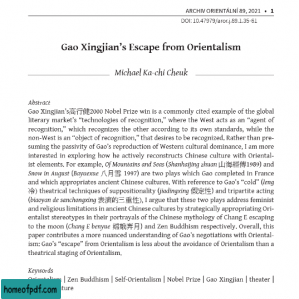Gao Xingjian’s Escape from Orientalism
该资源由用户: 北陆云辰 上传 举报不良内容

尊敬的读者:
欢迎您访问我们的网站。本站的初衷是为大家提供一个共享学习资料、交换知识的平台。每位用户都可以将文件上传至网盘并分享。
然而,随着用户上传的资料增多,我们发现部分不宜或版权问题的书籍被分享到了本站。
为此,我们已经关闭了分享入口,并进行了多次书籍审查,但仍有部分内容未能彻底审查到位。
在此,我们恳请广大读者与我们共同监督,如发现任何不宜内容,请 点击此处 进行举报,我们会第一时间处理并下架相关内容。
希望我们能共建一个文明社区!感谢您的理解与支持!
猜你喜欢

《60天完美口才打造计划》杨海洋全新版
View more
《60天完美口才打造计划》杨海洋全新版

《世界奇闻怪事全知道》崔钟雷 修订版
View more
《世界奇闻怪事全知道》崔钟雷 修订版

《稻盛和夫阿米巴:经营实践》套装共2册阿米巴经营经典版
View more
《稻盛和夫阿米巴:经营实践》套装共2册阿米巴经营经典版

《货币战略论》张五常
View more
《货币战略论》张五常

《巴菲特的财富金律》德群全新版
View more
《巴菲特的财富金律》德群全新版

《我们人类的宇宙:138亿年的演化史诗》克里斯托弗•波特升级版
View more
《我们人类的宇宙:138亿年的演化史诗》克里斯托弗•波特升级版

《平面犬》乙一中文经典版
View more
《平面犬》乙一中文经典版

《故宫里的博物学:给孩子的清宫海错图》夏雪著文字版
View more
《故宫里的博物学:给孩子的清宫海错图》夏雪著文字版

grokking Machine Learning - Luis G. Serrano
View more
grokking Machine Learning - Luis G. Serrano

《如何把事情做到最好》乔治·伦纳德修订版
View more
《如何把事情做到最好》乔治·伦纳德修订版

《我之为我,只在异人处:众说木心》夏春锦经典版
View more
《我之为我,只在异人处:众说木心》夏春锦经典版

《金钱不能买什么:金钱与公正的正面交锋》[美]迈克尔·桑德尔
View more
《金钱不能买什么:金钱与公正的正面交锋》[美]迈克尔·桑德尔


